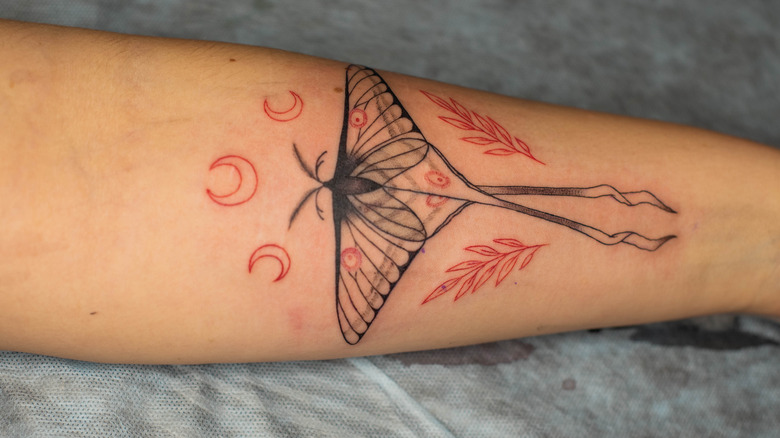Are Some Tattoo Designs Illegal To Get?
Tattoos are lauded as innovative and excellent artistic ways to express oneself, and in recent years, they've become more popular than ever. There are even made-to-fade tattoos that can help you get the feel of one without committing to it forever. But while some may question what happens to your body when you get a tattoo, the decision is ultimately yours. Or is it?
The big grey area you may face when getting a tattoo is actually its legality. Typically when thinking about tattoo restrictions, we might consider age restrictions or needing parental consent if you're under 18, per Wisegeek, but some tattoo designs can face legal repercussions.
Tattoos facing law jurisdiction is nothing new. According to Custom Tattoo Design, examples of tattoo laws around the world include North Korea's ban on tattoos that contain religious iconography; Denmark's ban of tattoos on one's face, hands, and/or neck; South Korea's law that only permits doctors to give tattoos; and Iran's comprehensive ban of tattoos, among others.
The traditional American mindset would declare some of these laws to be against natural human rights, but Americans should also know the legality of their own tattoos.
These tattoos may infringe on copyrights
In the United States, we value property a lot. This includes intellectual property, which is protected by copyright law. While tattoos of Nazi symbols, Buddha, or Islamic religious symbols can get you in great trouble around the world according to Metro, the law is a little looser in the U.S. Instead, you have to be wary about copyrighted characters, logos, and any other designs that utilize parts or all of copyrighted materials.
According to WH Law, a firm based out of Tampa, Florida, tattoos are copyrighted materials because they're art. However, the copyright owner isn't clear under U.S. law, and it gets trickier if the tattoo contains material such as a logo from a film or television series, as these are already copyrighted materials.
"Tattoos like these likely violate the copyright of the owner of the work. Both the artist and the canvas, can be exposed to liability for damages. Under U.S. copyright law, the holder of the copyright may be entitled to an award for damages and lost profits resulting from the infringement," WH Law explains. "Statutory damages awarded to the copyright holder can be as high as $150,000 in certain circumstances."
Is this practical, though? Is the copyright holder from Disney going to see your "Frozen" tattoo while you're out? Probably not. Plus, Disney would have to prove that you caused them to lose profits. At the end of the day, get tattoos that speak to you as long as they're within reason, and always be respectful of others and their cultures. Oh, and let us know if you find any jobs that actually prefer if you have tattoos!

